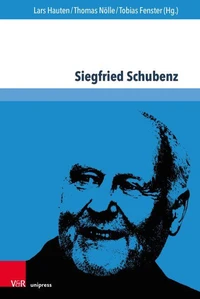Psychotherapie als soziale Praxis
Par :Formats :
Disponible dans votre compte client Decitre ou Furet du Nord dès validation de votre commande. Le format PDF est :
- Compatible avec une lecture sur My Vivlio (smartphone, tablette, ordinateur)
- Compatible avec une lecture sur liseuses Vivlio
- Pour les liseuses autres que Vivlio, vous devez utiliser le logiciel Adobe Digital Edition. Non compatible avec la lecture sur les liseuses Kindle, Remarkable et Sony
 , qui est-ce ?
, qui est-ce ?Notre partenaire de plateforme de lecture numérique où vous retrouverez l'ensemble de vos ebooks gratuitement
Pour en savoir plus sur nos ebooks, consultez notre aide en ligne ici
- Nombre de pages123
- FormatPDF
- ISBN978-3-8470-1395-2
- EAN9783847013952
- Date de parution11/04/2022
- Protection num.pas de protection
- Taille4 Mo
- Infos supplémentairespdf
- ÉditeurV&R Unipress
Résumé
Psychotherapie wird heutzutage ganz selbstverständlich als eine Sparte der Heilkunde begriffen. Früher wurde die Sorge um die Seele jedoch nicht allein als Disziplin der Heilkunde aufgefasst. Denn auch Philosophen und Priester sowie alle, die in ihren jeweiligen Gemeinschaften Verantwortung übernahmen, »sorgten« sich um das »Seelenheil« der ihnen Anvertrauten. Trotz all der neuen Behandlungsmöglichkeiten und -konzepte, welche das Instrumentarium heute psychotherapeutisch Tätiger enorm bereichern, stellt diese Eingrenzung auch eine Verarmung dar, die sich nicht nur in der Theorie, sondern auch in der Praxis zeigt.
Thomas Nölle stellt die Psychotherapie in diesem Band in einen größeren Zusammenhang und definiert sie als eine soziale Praxis mit maßgeblich heilkundlichem Charakter. Nowadays, psychotherapy is usually understood as a part of medicine. In the past, however, mental health care was not interpreted in terms of medical treatment alone. Philosophers and priests, as well as all those who assumed responsibility in their respective communities, also "cared" for the "salvation of the soul" of those entrusted to their care.
Despite all the new treatment possibilities and concepts that enormously enrich today's psychotherapy, this limited understanding also leads to an impoverishment, not only in theory but also in practice. Thomas Nölle attempts to place psychotherapy in a larger context than just the medical model, expanding its understanding against its socio-cultural history and current background. According to him, it is best understood as a social practice.
Thomas Nölle stellt die Psychotherapie in diesem Band in einen größeren Zusammenhang und definiert sie als eine soziale Praxis mit maßgeblich heilkundlichem Charakter. Nowadays, psychotherapy is usually understood as a part of medicine. In the past, however, mental health care was not interpreted in terms of medical treatment alone. Philosophers and priests, as well as all those who assumed responsibility in their respective communities, also "cared" for the "salvation of the soul" of those entrusted to their care.
Despite all the new treatment possibilities and concepts that enormously enrich today's psychotherapy, this limited understanding also leads to an impoverishment, not only in theory but also in practice. Thomas Nölle attempts to place psychotherapy in a larger context than just the medical model, expanding its understanding against its socio-cultural history and current background. According to him, it is best understood as a social practice.
Psychotherapie wird heutzutage ganz selbstverständlich als eine Sparte der Heilkunde begriffen. Früher wurde die Sorge um die Seele jedoch nicht allein als Disziplin der Heilkunde aufgefasst. Denn auch Philosophen und Priester sowie alle, die in ihren jeweiligen Gemeinschaften Verantwortung übernahmen, »sorgten« sich um das »Seelenheil« der ihnen Anvertrauten. Trotz all der neuen Behandlungsmöglichkeiten und -konzepte, welche das Instrumentarium heute psychotherapeutisch Tätiger enorm bereichern, stellt diese Eingrenzung auch eine Verarmung dar, die sich nicht nur in der Theorie, sondern auch in der Praxis zeigt.
Thomas Nölle stellt die Psychotherapie in diesem Band in einen größeren Zusammenhang und definiert sie als eine soziale Praxis mit maßgeblich heilkundlichem Charakter. Nowadays, psychotherapy is usually understood as a part of medicine. In the past, however, mental health care was not interpreted in terms of medical treatment alone. Philosophers and priests, as well as all those who assumed responsibility in their respective communities, also "cared" for the "salvation of the soul" of those entrusted to their care.
Despite all the new treatment possibilities and concepts that enormously enrich today's psychotherapy, this limited understanding also leads to an impoverishment, not only in theory but also in practice. Thomas Nölle attempts to place psychotherapy in a larger context than just the medical model, expanding its understanding against its socio-cultural history and current background. According to him, it is best understood as a social practice.
Thomas Nölle stellt die Psychotherapie in diesem Band in einen größeren Zusammenhang und definiert sie als eine soziale Praxis mit maßgeblich heilkundlichem Charakter. Nowadays, psychotherapy is usually understood as a part of medicine. In the past, however, mental health care was not interpreted in terms of medical treatment alone. Philosophers and priests, as well as all those who assumed responsibility in their respective communities, also "cared" for the "salvation of the soul" of those entrusted to their care.
Despite all the new treatment possibilities and concepts that enormously enrich today's psychotherapy, this limited understanding also leads to an impoverishment, not only in theory but also in practice. Thomas Nölle attempts to place psychotherapy in a larger context than just the medical model, expanding its understanding against its socio-cultural history and current background. According to him, it is best understood as a social practice.







